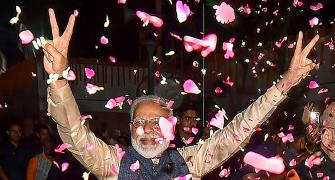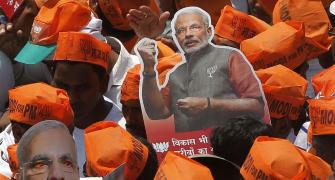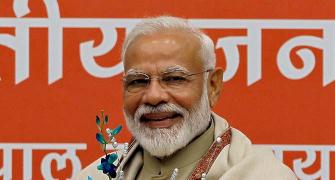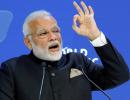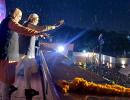'Wisdom demands Modi moves to restore the critical institutions of the State and dial back on the cult building around his persona,' say Sonali Ranade and Shealja Sharma.

Prime Minister Narendra Damodardas Modi's victory in 2019 is a triumph of populism over a liberal democracy.
Populism has often been defined as an illiberal democracy that relies on majoritarianism but bypassing many of the others aspects critical to a democracy.
Populism poses a direct threat to democracy and its institutions.
Democracies are uniquely susceptible to populism and have a way of being waylaid by it from time to time.
India itself witnessed a spell of populism under Indira Gandhi in the early 1970s that did not play out well and culminated in an Emergency where democracy itself was derailed.
It is imperative therefore to pause at this juncture to understand what is exactly is populism, and how and why democracies succumb to it.
Political scientists have studied populism's political character and it is well worth reviewing this here in order to be better placed to negotiate the perilous way ahead.
Populism may be defined as a process of political mobilisation that transcends party structures and seeks to build people's support around a charismatic personality by creating a direct link between the leader and people using mass communication technologies like the media, including social media, mass rallies, propaganda etc.
The essential difference between a populist mobilisation and other forms of political mobilisation is that the link between the leader and supporters is direct, non-intermediated by political party or institutions, and light on ideology.
The person of the populist leader is the rallying cause per se. The causes he or she espouses are transitory, ever changing according to political need, and are usually formulated in such way as to cut across all established political parties and structures.
For instance, Modi's appeal to Hindu nationalism is designed to cut across the usual caste and class structures around which normal politics has been built so far.
Populism also seeks to create a people versus other paradigm where the other may be economic, social or political elites, minorities, and liberals, whatever.
The aim is to fragment existing political structures and attract support of the floating opinion towards the leader's strong and charismatic personality.
The causes could be anything from ethno or religious nationalism, communal polarisation, to vaguely structured peoples vs established elites.
The cause itself is secondary, but focuses on an existing political fault line.
Populism doesn't arise in a vacuum. It is usually a reaction to something else that happens in the polity or the economy. Looking at the way populist movements arose in history, from that in Germany in the 1930s, to those caused by failing economies in Latin America to our very experience with populism under Indira Gandhi, we may surmise that populism is occasioned by a breakdown in the ability of existing political parties to cope with change in the polity.
In the case of Indira Gandhi, the patronage distribution system on which the Congress party was built broke down after Jawaharlal Nehru's death.
Without control of the brokers who worked the system, Indira Gandhi had no choice but to resort to populism appealing directly to people with a catchy 'Garibi Hatao' slogan over the head of the Congress party.
This ruptured the party apparatus, split it into two, but she was never able to rebuild the patronage system in full in all geographies.
With that began the decline of the Congress party structures.
Elsewhere in the world, populism has arisen out of an economic crisis as in Latin America or collapse of political system as in the post-Communist Soviet system.
Currently, we are seeing populist movements in Europe and the US triggered by the threat of immigration.
Whatever be the proximate cause, populism is invariably accompanied by an inability of existing political structures to cope with a discontinuity in the political, social or economic environment.
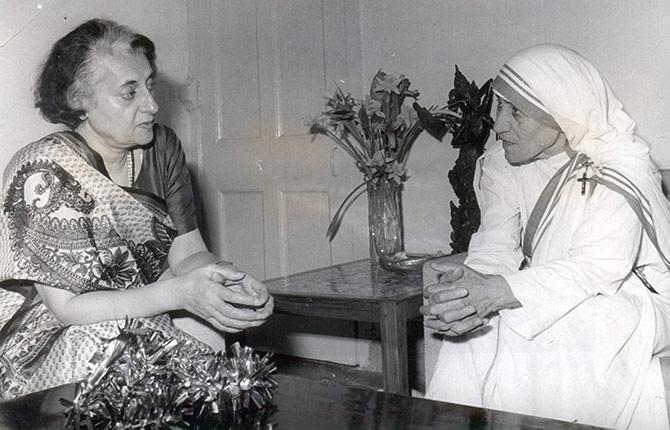
Closer to our times, we witnessed such a discontinuity in the system occasioned by bankruptcy that necessitated economic reforms. As a consequence of those reforms, the patronage system of the Congress party was shattered in 1990-1991 because they transferred effective power over resources from the Centre to the states.
Effective control of the patronage system had already faced considerable dilution as sub-national actors within or outside the Congress captured power in the states.
They developed their own patronage networks and cultivated their own satrapies, often using populism as the means to build support for themselves using sub-nationalism and regional pride.
We saw such satrapies in Andhra, Bihar, Tamil Nadu and West Bengal. Indeed, we saw one in Gujarat under Modi himself.
This shattering of the patronage system within the Congress party structures at the Centre created a vital power vacuum that was never filled under Sonia Gandhi or Manmohan Singh.
The irony is that the Congress lost power because it dismantled its own funding model without creating an alternative.
It was not corruption, but lack of it under UPA I and II that led to its downfall. Which is not to say there were no corrupt ministers in UPA. Merely, that the funds they raised didn't get to the central kitty.
Which perhaps explains the alacrity with which the Bharatiya Janata Party filled the vacuum with anonymous electoral bonds.
Corruption is now fully sanitised and legal.
Modi's populism is therefore a reaction to the breakdown of the patronage system and an effort to resurrect it under a different name.
However, Modi's populism is not just the garden-variety pure populism.
Political mobilisation is usually characterised as progmatic, patronage based or populist.
A core of progmatic political mobilisation represented by the Rashtriya Swayamsevak Sangh and its vast organisational and ideological resources backs Modi.
This progmatic agenda of the RSS relies heavily on communal polarisation as well as upper caste opposition to affirmative action.
It is anti-Muslim and anti-lower castes.
This core, however, cannot produce the required numbers for electoral domination of the polity.
Historically, the BJP's vote share has struggled to get past the 25% mark. Modi's utility lies in energising this core with Hindutva and adding to the core with a lot of floating supporters and unattached voters attracted by his personality as a strong leader who has a vision of a strong and prosperous India.
That this additional layer of support is ideology-thin is by design, not accident.
The lack of a clear-cut ideology/programme gives him flexibility to go for whatever sells at the moment.
It also has the effect of amplifying the Hindutva message which otherwise would be restricted to just the core.
It is also essential to realise that Modi's populism is the effect of not only the breakdown of the established patronage system of the Congress, but also a deep response of the people to the populism of populist leaders at the regional and/or state level.
Modi did not invent populism. That form of political mobilisation has long been in use in the states, be it Tamil Nadu, Andhra, West Bengal, Odisha, Gujarat, Maharashtra, Bihar and even Uttar Pradesh under many regional populist leaders like M G Ramachandran, M Karunanidhi, N T Rama Rao, Mamata Banerjee, Biju Patnaik, Lalu Prasad Yadav or Mayawati.
They were all ideology-thin, non-patronage based political players, who built their parties around a single idea, ranging from regional autonomy in Tamil Nadu, caste-based mobilisation in UP/Bihar, to regional pride in Gujarat, Bengal etc.
The Shiv Sena in Mumbai began its politics as a labour union busting organisation favoured by tycoons, but latched onto Shivaji and regional Maratha pride later.
So populism is not something new.
However, these regional populisms have asserted themselves against the Centre at times, and are seen as centrifugal tendencies that are gathering strength.
At times, populism can only be fought with populism.
Modi has been able to build his version of populism as something countering fissiparous trends in the polity, vaguely portrayed as misguided liberalism, minority appeasement, regionalism or separatism, etc.
It helps that the border states like Kashmir, Punjab, Bengal, Assam, Tripura, even Kerala with its Gulf connection, have higher percentage of minorities and have been among the first to fall to regional populist leaders. Tamil Nadu too falls in this category, but for a different reason.
This feeling of a latent sub-nationalism led by populist regional leaders evokes a counter in the form of Modi's potent nationalistic appeal.
Whether it is the right response or not is a different matter. What is important is that Modi is not the only populist in town.
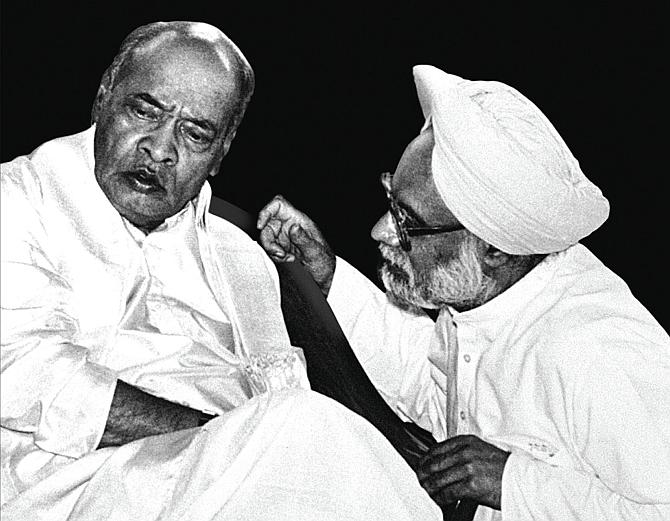
The Congress has largely failed to grasp the emerging political challenges after P V Narasimha Rao. The failure began not with Rahul Gandhi, but his mother and at two levels.
Firstly, despite the stunning success of the 1990-1991 reforms, Sonia Gandhi failed to take pride in them and rebuild her party around them.
Instead, she continued the party's hugely dysfunctional and largely futile alliance with a Marxist cabal around her that frustrated all meaningful reforms after Narasimha Rao.
Secondly, she was unable or unwilling to rebuild the patronage systems her party depended on and allowed a free for all system to evolve that amplified the perception of corruption in her party.
There is simply no escape from the reality of party funds. If you don't centralise them, you hand over the party apparatus to regional satraps and pay a double price. Corruption not only increases, but you cannot escape the blame for it.
So under Sonia Gandhi, not only did the Congress lose its ideological moorings to economic reforms but gained a stench for corruption -- largely unjustified and grossly exaggerated -- that it has been unable to shake off since.
Rahul Gandhi has been unable to rebuild the Congress party as per his dreams despite a decade of trying. But like Sisyphus, he keeps trying to roll his heavy rock up the hill in the same way as before, hoping for a change of luck.
Just as there is no free lunch in a dog eat dog world, there is no such thing as a lucky break in highly competitive politics.
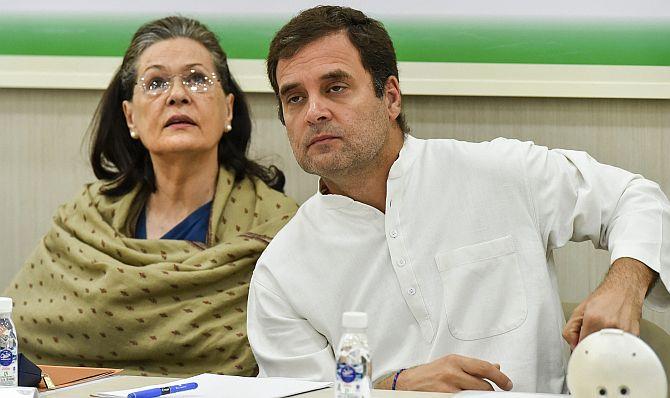
The fact is Rahul will never be able to rebuild his party the conventional way because the building blocks no longer exist.
As his party's empty treasury should tell him, the old patronage system is gone from his grasp. It has been captured by Modi-Shah and they aren't about to do him any favours.
Without funding, party machines cannot be kept in good repair. They wither away.
The Congress now faces the uphill task of finding a charismatic leader who can fashion a populist movement to take on the BJP juggernaut.
It is an advantage that his party once enjoyed. Now the shoe is on the other foot.
Short of populism, there is simply no other viable alternative for political mobilisation available to the Congress any more.
In short, he has to be the charismatic leader with a powerful populist programme that can work on a shoestring budget or it is game over. He has no other choice.
What of the polity? It is hard to say how this 'national' populism versus regional populism will play out. The future is portentous.
We can pretend everything is normal now that we have a strong popular leader at the Centre.
But two things should be clear.
India is a State with 20-odd potential nations who fulfill the criteria of a distinct people, culture, history, language and geographical contiguity.
The regionalism that we see at the periphery is well grounded in latent sub-nationalism.
The glue that holds the Indian State together against the regional pull of latent sub-nationalism is a common market, common law, growing economy and most, important of all, lived experience.
What does not hold it together is a 'strong Centre'.
The RSS may fondly hope that Hindu-Hindi-Hindustan will hold everything together, but this is far from proven.
We will never be able to resort to coercion, alone or in a major way, to hold the periphery. We will hold them only through a shared vision of the future.
Populism will not suffice to tamp the divisive forces arising out of the stoking of Hindu sub-nationalism that has become the defining signature of the Hindu Right.
If anything, it will accelerate the fissiparous tendencies by legitimising sub-nationalism and provoking regional leaders to exploit it in order to cement support for themselves.
Tamil Nadu provides a classic example of how to build a two-party regional political system that shuts out pan-India parties. The model can be easily copied in other states as well.
The Hindu-Hindi-Hindustan formulation has very limited appeal. That fact should not be obfuscated by Modi's pan-India appeal.
Nor should we buy the idea that Hindu nationalism per se will unify the polity. India is just too diverse for that.
We should also not forget that no meaningful economic reform is possible without real economic decentralisation, and the latter is impossible without regional autonomy.
Wisdom demands Modi dial back on Hindu nationalism. It has served its limited purpose, if at all it had a purpose.
Wisdom demands Modi moves to restore the critical institutions of the State and dial back on the cult building around his persona.
And wisdom also demands that Opposition parties sit down together and evolve a common programme. If they don't hang together, they will hang separately.
Populism has rarely ended well despite good intentions. It is inherently illiberal, and impatient with democracy and rule of law.
It is impelled to justify every shortcut with the mandate that the populist leader enjoys.
It refuses to abide by checks and balances of institutions.
And it has scant respect for dissent.
It is impossible to say how India's second tryst with unabashed populism at the Centre will end.
We can only hope that rule of law, democracy and its institutions and the innate good sense of our people will prove enough of a check against its excesses.

